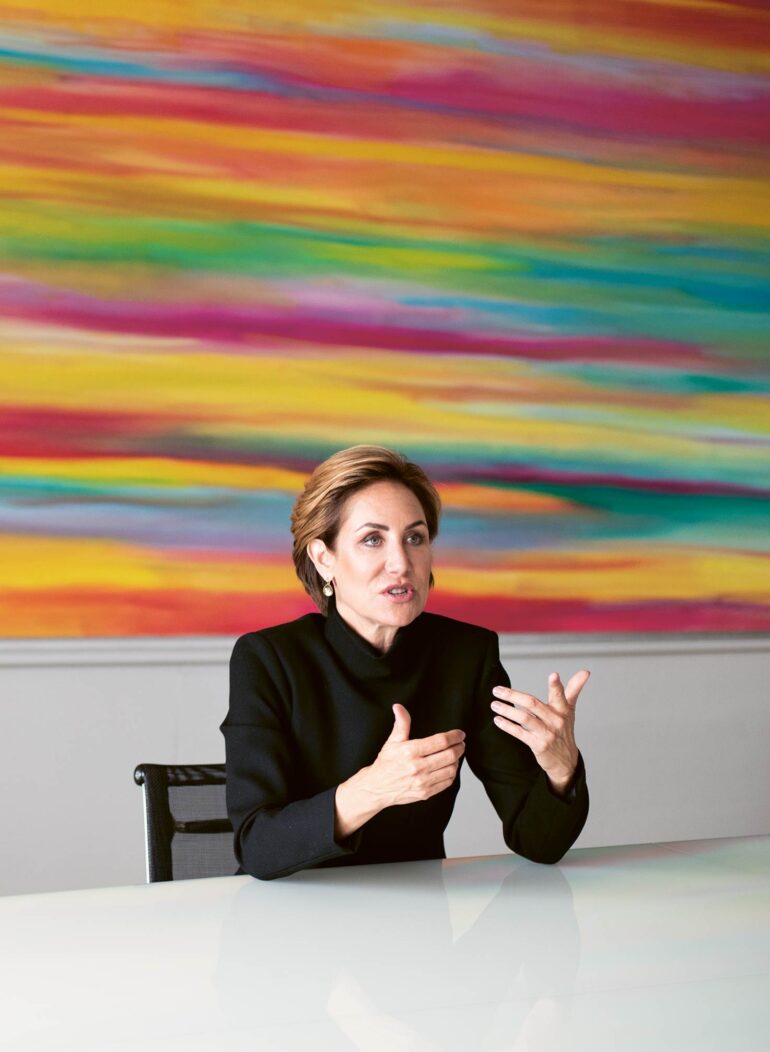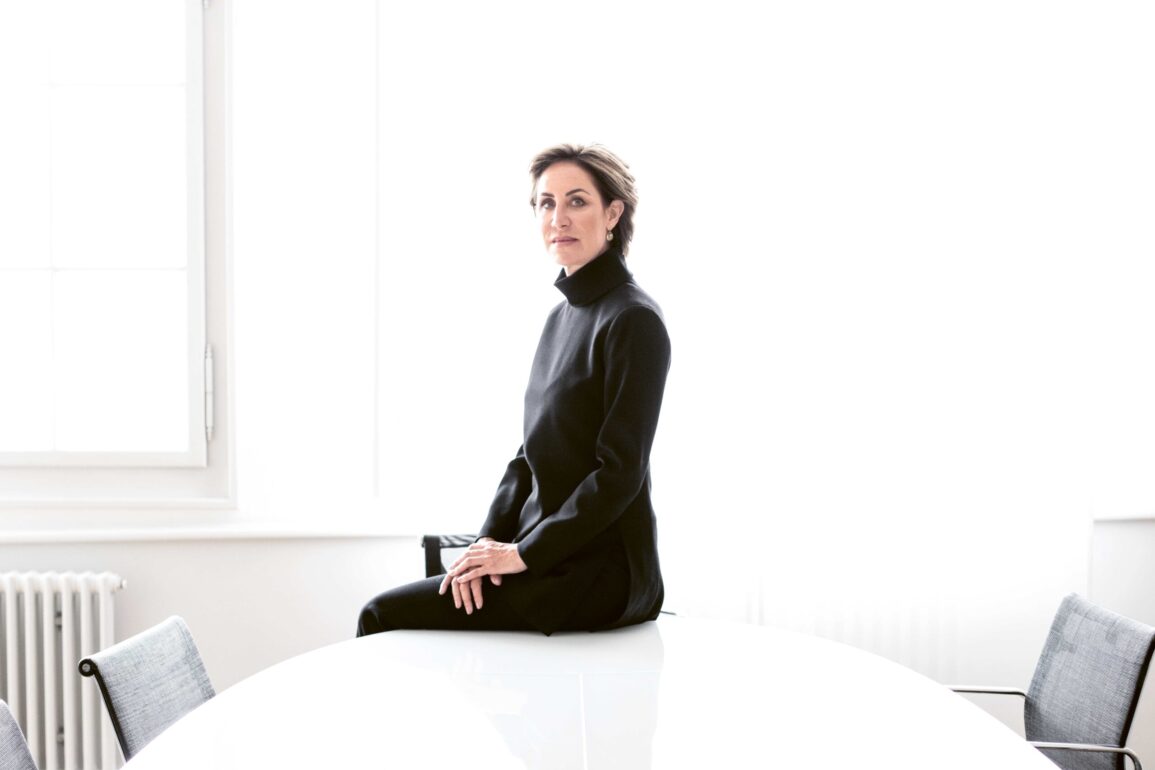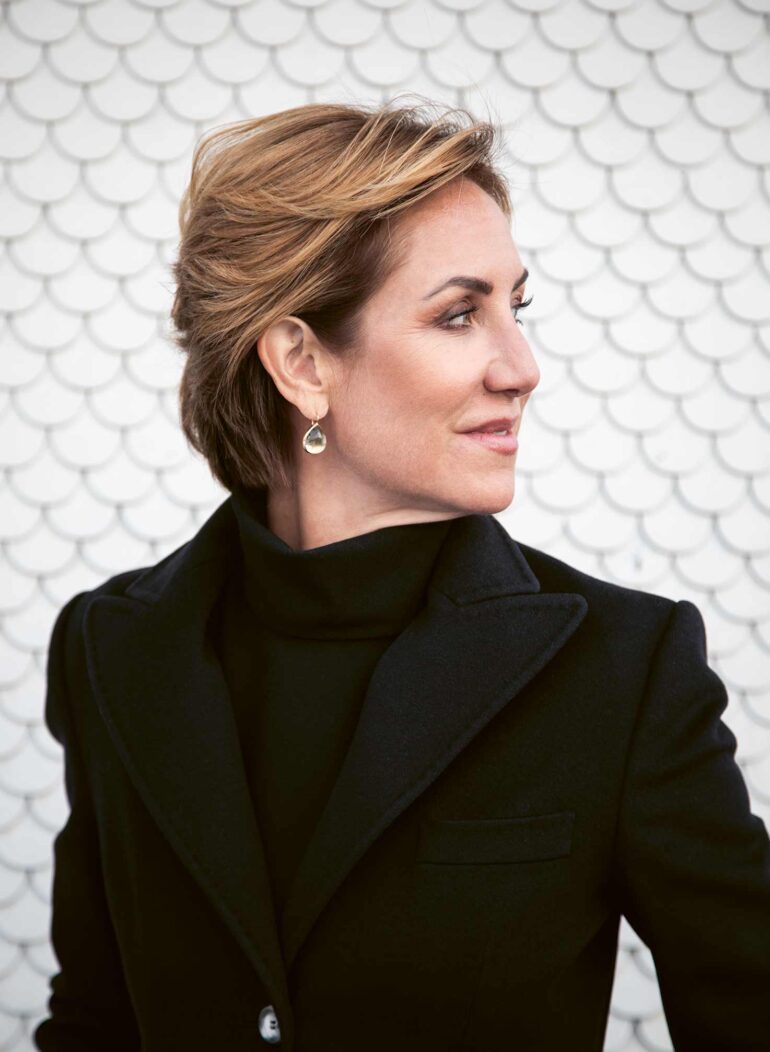Carolina Müller-Möhl is one of the most dedicated and high-profile philanthropists in Switzerland. The Müller-Möhl Foundation is active in the areas of education, local development and the advancement of women. She sees individual taxation as a major step on the road towards gender equality.
You have dedicated yourself to gender equality for around 20 years now. You build bridges between different stakeholders and campaign for basic conditions that facilitate equal opportunities. Why is the Swiss taxation system key for you when it comes to this issue?
We want to get more women into the workplace and into decision-making positions. Many years of experience have shown me that our current taxation system is a major hindrance. Introducing individual taxation for married couples would help our cause. It would be a real milestone.
What exactly would individual taxation do?
If both members of a married couple with children are earning, they will end up in a higher tax band and miss out on childcare subsidies. If they have a second child – if not before – the second salary will usually barely cover the cost of childcare. And that second salary is usually the woman’s. This runs contrary to my liberal economic viewpoint.
How so?
Working needs to pay off. If taxation is based on the total of both salaries, this creates the wrong incentives. Individual taxation also takes another factor into account. We are all born into this world alone, and we die alone. Gender plays no role in that. And a person’s civil status makes no difference in the end, either. This is reflected in the fact that we all have our own passports. I think a logical conclusion would be that we should all be able to sign our own tax return, too.
What effect would individually calculated taxation have?
Individual taxation would create positive employment incentives. In 2019, we teamed up with alliance f to commission a study with ECOPLAN. This showed what we could achieve by removing the adverse taxation effects on a couple’s second salary. We would be able to attract employees back to the workforce. The study says this could be in the order of 40,000 to 60,000 full-time positions.
Would this have a positive impact on the shortage of skilled workers?
Yes. Individual taxation would make economic sense. It could boost the economy. Having more women in employment would result in a better cost-benefit ratio. Switzerland has a heavily subsidised education system right through to university level. It makes no economic sense for well-educated female lawyers and medics, for example, to leave the job market entirely once they get married and have their first child. On average, these highly qualified women are no longer in employment past the age of 30.
Why is it so important for women to stay in employment?
For many years now, the birth rate has been around 1.5 children per woman. In order for women to re-enter the job market at a later stage, it’s important that, wherever possible, they do not leave employment completely and for an extended period while they start a family.
Continued employment for women also reduces their risk of poverty in old age. It would improve their health, too – evidence shows that people in employment fall sick less often.
How important are financial considerations for equality in general?
Employment means earning your own money, gaining financial independence and purchasing power, a better pension plan, etc. It’s essential.
What do you think possible solutions could be?
In my view, the solution lies in joint action by different stakeholders. We all need to be pulling in the same direction. The economy, politics, society, media, culture and, above all, women themselves all need to be striving for equality.
‘I believe we will only be able to achieve equality in future if the majority of women fight for equality.’
Carolina Müller-Möhl
What role does philanthropy play?
In my experience, the government and private business carry the main burden of responsibility. But charities can raise awareness of important issues. They can act faster and with more agility. If there is no government funding available for a study, a charity can step in quickly and straightforwardly. This means charities can draw attention to certain topics and put them on the political agenda.
Is that why you created the Müller-Möhl Foundation?
I see myself as a philanthropist – someone who cares about people. Fighting injustice and providing support has always been my philosophy. Which is how I found myself in 2012 acting on numerous boards. It was a comment by a friend that sparked the creation of the Müller-Möhl Foundation. He said it was difficult to keep track of all the things I was involved in, and I needed to create an appropriate framework.
So you wanted to unite all of your areas of engagement?
I wanted to bring all of my commitments, interests and collaborations with charitable organisations under one roof. And I wanted to professionalise the work I was doing.
Meaning?
Today, we are a team of four. And, of course, we also work with external partners, on things like legal matters, for example.
You are active in the areas of education, local development and work-life balance – women’s advancement, in other words. How did you find yourself focusing on these areas?
They were all somewhat neglected areas in Switzerland at the time the Müller-Möhl Foundation was formed, in particular women’s issues.
What links the areas you are active in?
These areas go hand in hand. For example, offering more extensive and better early-childhood care and education enables a better work-life balance. That applies to both mothers and fathers. We backed this up in a study: when parents know that their children are well supported and receiving a good education, they feel more secure. This is the basis for combining work and family life. Education and training is also linked to local development. More women re-entering employment contributes to more economic growth. This boosts local development and helps combat the shortage of skilled workers. This, in turn, overlaps with other projects of mine, such as my work with Avenir Suisse.
How do you support women who are re-entering the job market?
The Müller-Möhl Foundation supports such programmes as ‘Women Back to Business’, which is run by the University of St.Gallen. We’ve been on board for over 13 years, from the very beginning. The programme offers a solution to the shortage of skilled workers, among other things. One answer to this issue is qualified female professionals. This boosts regional and local development and contributes to a healthy future economy. The programme is also available in English and is continually being developed. Soon it will be available online, too.
Has the programme proved effective?
Many women and mothers are looking to re-start their careers. But they feel unsure after having been absent from the professional world for so long. They may be under-qualified or not have planned their career sufficiently. Or they may lack self-confidence and haven’t promoted themselves enough. Many women never find their way back into employment after having children in their 30s. That’s where ‘Women Back to Business’ comes in. This high-calibre programme was developed together with Prof. Gudrun Sanders from the University of St.Gallen. Over the last 13 years, the Müller-Möhl Foundation has functioned first and foremost as a contributor of ideas. We have invested our time, opened doors, contributed our extensive experience to the project and provided financial support. This is the foundation’s usual way of doing things.
How high is the success rate?
Three quarters of participants successfully re-enter the job market. The programme thus makes an important contribution to gender equality. Women can return to the workplace, fulfil their professional potential, live independent lives and enjoy more security thanks to greater financial awareness.

How do they gain greater financial awareness?
We promote financial literacy, i.e. provide general education in the area of finance. We encourage women to take an interest in finance, and as part of other projects, we help prevent young people getting into debt. Financially independent citizens with entrepreneurial and financial know-how make more deliberate decisions.
What is your view on gender equality in the charitable sector?
The sector is hugely male-dominated. Men make up 80 percent of management committees. Around a third of foundation committees are all-male. These decision-making committees – which manage billions of francs – are in no way representative of wider society. This will only change if people who currently sit on charity boards elect women to those boards. This isn’t always possible, however.
Why not?
Some charities have statutes stipulating that donors be represented on the board of trustees. If the money comes from a private company with a male CEO and a male chairman of the board, and one of them has to join the charity board…
It’s a structural problem, then?
Yes, very much so.
How can we promote gender equality within companies, in that case?
The important thing is to create the right conditions. EDGE, one of our partner organisations, is the world’s leading gender equality assessment and certification body. Companies can use an assessment tool to see how they compare to other companies when it comes to gender equality. Areas of assessment include pay, promotions and mentoring. The tool also highlights areas where there is potential for improvement. Businesses that complete the process also receive a certificate.
The fact that there are still certifications indicates that gender equality is far from being a given. And yet diversity has been a hot topic for years. Are there signs that people are feeling a kind of fatigue?
The WEF’s Global Gender Gap Report 2020 ranked Switzerland 34th in terms of women’s economic participation. When it comes to all other economic indicators, by contrast, we are always right at the top. We are simply not ambitious enough when it comes to gender equality!
Should every strategic committee include someone responsible for gender diversity?
That’s a good suggestion. Especially if the committee and the charity wants to move forward and stay at the cutting edge.
Philanthropy based on conviction
In 2000, Carolina Müller-Möhl started the Müller-Möhl Group, a single-family office specialising in investment. She created the Müller-Möhl Foundation in 2012. She was previously a member of the board of Nestlé S.A., and currently serves on the board of the NZZ public limited company (AG) and various other committees. Her core values are personal responsibility, independence, courage, tolerance, justice and dedication. She sees herself as a committed citizen. She believes in people’s individual responsibility, and in a liberal economic and value system.
www.mm-foundation.org
Photo: Anne Gabriel-Jürgens
In addition to education and local development, you are also active in the area of culture.
We work with the Orpheum Foundation, which supports young classical soloists. When I was first approached, my initial response was that it wasn’t really my area – unless we were going to be supporting women in classical music. When we took a closer look, however, we soon realised just how few of the top positions in classical music are occupied by women. There are very few female conductors and orchestral directors. You see far fewer female soloists on stage, too – despite the fact that, in principle, we all agree that talent is not dependent on gender. The aim of our fundraising concerts is to set a counterexample by giving the stage to outstanding female musicians. Because at the end of the day, we only believe what we see in action. Female role models will encourage female talent to follow in their footsteps.
The second women’s strike got a lot of people out on the streets.
The second women’s strike in 2019 demonstrated women’s solidarity. That really moved me. And it frustrates me when women say everything is just fine, when they deny that there are clearly identifiable structural obstacles at both the governmental and corporate level. And then there’s the issue of unconscious bias. All of this continues to prevent women being treated equally in the workplace and enjoying equal opportunities in their professional careers.
What’s your outlook on the future?
I’m hopeful that the 50th anniversary of women’s suffrage in Switzerland – which we should all be celebrating together – will give us the push we need, including when it comes to introducing individual taxation. I believe we will only be able to achieve equality in future if the majority of women – and we are a statistical majority – fight for equality.




